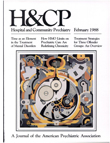Stress and Coping in Relatives of Burn Patients: A Longitudinal Study
Abstract
Standardized psychological assessment of 48 close relatives of patients hospitalized for burns revealed that the relatives experienced high levels of distress diring the acute phase of the patient's hospitalization. At six-month follow-up, the relatives' general psychological symptomatology had receded to within the normal range, but 25 percent continued to show specific stress syndromes characterized by intrusive and avoidant responses to the past burn trauma. Intrusive-avoidant stress responses could not be predicted by demographic information, severity of the burn, facial disfigurement, or actual responsibility for the burn, but blaming oneself for the injury to the patient was a significant predictor. Evaluating stress responses of close relatives after burn trauma can lead to more successful intervention for those who remain stressed and may enhance patient and family compliance with the treatment and rehabilitation regime.
Access content
To read the fulltext, please use one of the options below to sign in or purchase access.- Personal login
- Institutional Login
- Sign in via OpenAthens
- Register for access
-
Please login/register if you wish to pair your device and check access availability.
Not a subscriber?
PsychiatryOnline subscription options offer access to the DSM-5 library, books, journals, CME, and patient resources. This all-in-one virtual library provides psychiatrists and mental health professionals with key resources for diagnosis, treatment, research, and professional development.
Need more help? PsychiatryOnline Customer Service may be reached by emailing [email protected] or by calling 800-368-5777 (in the U.S.) or 703-907-7322 (outside the U.S.).



